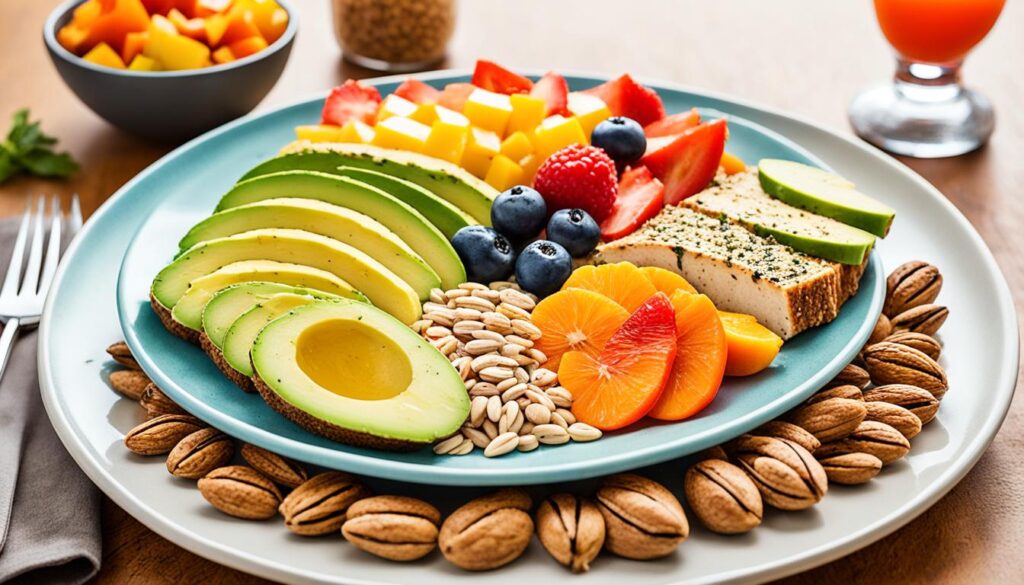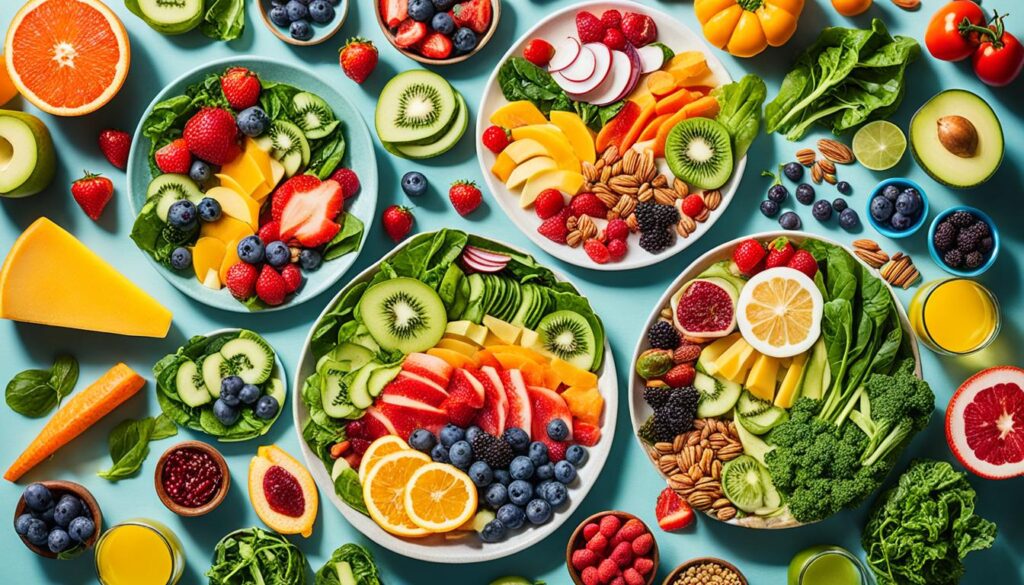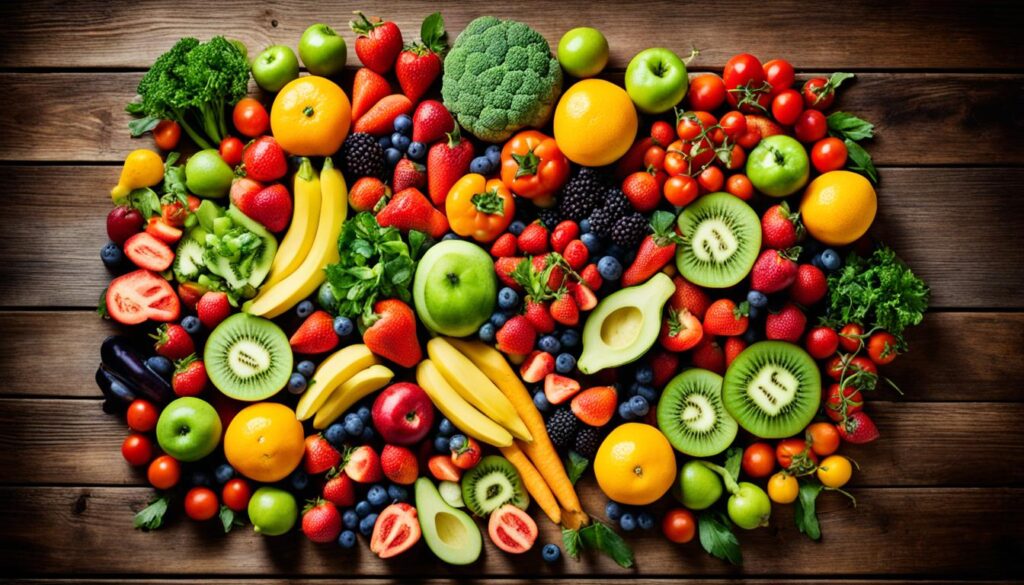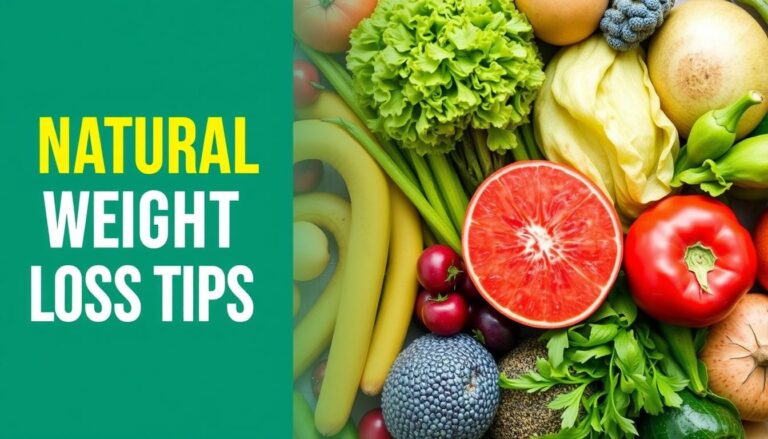Imagine a world where your plate makes you happy and keeps you healthy. Welcome to the balanced diet, the secret to a vibrant life.
But what makes a diet balanced, and how does it change your health? Get ready for a food journey that will boost your energy and confidence.
Key Takeaways
- Discover the essential components of a balanced diet and how they impact your overall health.
- Explore the role of macronutrients carbs, proteins, and fats in fueling your body and supporting its various functions.
- Uncover the hidden power of micronutrients (vitamins and minerals) and their unsung contributions to your well-being.
- Learn practical strategies for meal planning, portion control, and incorporating whole foods into your daily routine.
- Understand the connection between a balanced diet and weight management, as well as the importance of mindful eating.
- Dive into the latest dietary guidelines and how they can serve as a roadmap to a healthier you.
- Embrace a balanced diet as a sustainable lifestyle choice, empowering you to thrive in every aspect of your life.
Why a Balanced Diet Matters
Keeping a balanced diet is key to good health and feeling great. Eating the right mix of nutrients does wonders for us. It boosts our energy and helps our immune system work better. A balanced diet can change our lives in big ways.
The Impact on Overall Well-being
A balanced diet does more than help with weight management. It also boosts our mental and emotional health. By giving our bodies the right foods we get sharper minds better moods, and more strength to handle life’s ups and downs.
Understanding Dietary Balance
- Macronutrients carbohydrates proteins and fats give us the energy we need.
- Micronutrients vitamins and minerals help our bodies work right.
- Finding the right mix of these nutrients is key to a balanced diet.
Eating a variety of whole unprocessed foods helps us meet our dietary needs. This sets us up for the best health and well-being.

Read more: Beat Insulin Resistance with a Plant Based Diet
A balanced diet is the foundation of a healthy life. It’s not just about the numbers on the scale, but the vitality and resilience we possess from head to toe.
Balanced Diet The Key Components
Crafting a balanced diet is key to good health and happiness. It’s all about mixing macronutrients carbs proteins fats with micronutrients vitamins and minerals. Knowing the important food groups helps us feed our bodies and minds well.
The main food groups for a balanced diet are:
- Fruits and Vegetables: These foods are full of vitamins, minerals, and antioxidants. They are the heart of a healthy diet.
- Whole Grains: Whole grains like whole wheat and quinoa give us complex carbs, fiber, and many nutrients.
- Lean Proteins: Lean meats fish eggs, and plant-based options are key for muscle growth and repair.
- Healthy Fats: Nuts seeds, avocados, and fatty fish are good for brain health hormone balance, and energy.
- Dairy or Dairy Alternatives: These offer calcium, protein, and important nutrients.
Adding these food groups to our meals makes a balanced diet that feeds our bodies, minds, and overall health. The goal is to balance our diet to fit our nutritional needs.
| Food Group | Key Nutrients | Benefits |
|---|---|---|
| Fruits and Vegetables | Vitamins, Minerals, Antioxidants | Boosts immune system, lowers inflammation, keeps skin and eyes healthy |
| Whole Grains | Complex Carbohydrates, Fiber, B Vitamins | Keeps energy up, aids digestion, lowers risk of chronic diseases |
| Lean Proteins | Amino Acids, Iron, Zinc | Helps muscle repair, supports immune system, keeps skin and hair healthy |
| Healthy Fats | Omega-3s, Monounsaturated Fats | Improves brain health, controls hormone levels, supports heart health |
| Dairy or Dairy Alternatives | Calcium, Protein, Vitamin D | Strengthens bones, helps muscle recovery, supports immune function |

Read more: The Gut Brain Connection Nutrition
A balanced diet is not about deprivation, it’s about nourishment. It’s about finding joy in the foods that fuel your body and your soul.
Conquering Macronutrients
Getting a balanced diet is like a fine art. It’s all about knowing how carbohydrates and proteins work together. This section will help you make smart choices for your health.
Carbs: The Fuel for Energy
Carbs give our bodies the energy they need. They help us stay active and keep our cells working right. By eating complex carbs like whole grains and veggies we keep our energy up all day. It’s key to know how carbs fit into a balanced diet for staying healthy.
Proteins: The Building Blocks
Proteins are crucial for building and fixing our muscles, tissues, and organs. They help with muscle growth repair, and keeping us strong. Adding lean proteins to our balanced diet boosts muscle building, helps with recovery, and keeps us full of energy and muscle.
If you’re into sports or just want to stay fit, eating enough proteins is a must.
| Macronutrient | Function | Food Sources |
|---|---|---|
| Carbohydrates | Primary source of energy | Whole grains, fruits, vegetables |
| Proteins | Muscle building and repair | Lean meats, poultry, fish, eggs, legumes |
Knowing how carbohydrates and proteins work in a balanced diet lets you make better food choices. It helps you stay healthy and full of energy. Finding the right mix of these macronutrients is key to getting the most from your diet.

A diet rich in carbohydrates and proteins is the foundation for a healthy energetic lifestyle.
Micronutrients The Unsung Heroes
Macronutrients like carbs, proteins, and fats are key for a balanced diet. But micronutrients vitamins and minerals are just as important. They help our bodies in many ways from keeping our immune system strong to making our bones healthy.
Vitamins and Minerals Galore
Our bodies need many vitamins and minerals to work right. For example, calcium and vitamin D help build strong bones. Vitamins C and E protect us from harm. A balanced diet makes sure we get enough of these micronutrients for good health.
Let’s talk about some important vitamins and minerals that are key:
- Vitamin A: Supports eye health and immune function
- Vitamin B12: Crucial for red blood cell formation and neurological function
- Folate (Vitamin B9): Aids in cell division and growth
- Vitamin C: Boosts immunity and collagen production for healthy skin
- Calcium: Builds and maintains strong bones and teeth
- Iron: Plays a vital role in oxygen transport and energy production
- Zinc: Supports the immune system and wound healing
Eating a variety of whole foods helps us get the micronutrients we need. A balanced diet is more than just about big nutrients. It’s about getting all the essential nutrients for our health.

Read more: Diet Over Exercise The Key to Beating Obesity
Embracing Whole Foods
A balanced diet is more than just counting calories or macronutrients. It’s about feeding your body with the right foods. At the core, this means choosing whole, minimally processed foods. These foods offer more benefits than their processed versions, leading to better health.
Whole foods like fruits veggies whole grains, and lean proteins are packed with vitamins, minerals, and fiber. These nutrients help your health in many ways giving you energy aiding digestion, and boosting your immune system.
On the other hand, processed foods often lose their natural goodness. They can be full of added sugars, unhealthy fats, and artificial additives that harm your body.
- Prioritize whole foods for their superior nutrient density.
- Avoid processed foods that are high in added sugars, unhealthy fats, and artificial ingredients.
- Embrace a balanced diet that emphasizes the power of whole, minimally processed foods.
Eating well is about more than just the numbers on a nutrition label it’s about nourishing your body with the right kind of fuel.
Switching to whole foods can greatly improve your diet’s potential. It can lead to more energy better digestion, and a stronger immune system. Enjoy the taste and health perks of whole foods and start feeling better overall.
| Whole Foods | Processed Foods |
|---|---|
| Nutrient-dense, natural goodness | Stripped of natural nutrients added sugars and unhealthy fats |
| Provide sustained energy and support overall health | Can negatively impact body’s function and well-being |
| Examples: fruits vegetables whole grains, lean proteins | Examples: refined carbs sugary snacks, frozen meals |

Read more: Nourish Your Body with Fruits and Vegetables
Choosing whole, minimally processed foods unlocks the true benefits of a balanced diet. It leads to more energy, better digestion, and overall well-being. Feed your body the right foods and see how a diet full of nutrient-dense whole foods can change your life.
Balanced Diet for Weight Management
Starting a healthy weight journey begins with a balanced diet. Understanding calorie balance helps us control portions and eat nutrient-dense foods. This supports our weight management goals.
Calories In Calories Out
Weight management is all about balancing calories in and out. A balanced diet gives our bodies the right energy. It prevents us from eating too much or too little. By eating nutrient-rich foods and controlling portions, we meet our weight goals.
- Focus on calorie balance, not just calorie counting
- Embrace nutrient-dense, whole foods to keep you feeling satisfied
- Practice portion control to avoid overconsumption
When we balance calories in and out, our bodies stay at a healthy weight. A balanced diet gives us the nutrients we need for good health. This helps us reach our weight management goals.
The key to weight management is not just about cutting calories, but about nourishing your body with the right balance of nutrients.
Choosing a balanced diet makes managing weight sustainable and fun. It’s not about cutting out foods we love. It’s about eating the right nutrients for our health and fitness goals.
Mindful Eating The Secret Sauce
Exploring a balanced diet reveals a key element that boosts health and well-being mindful eating. It’s more than just eating right it’s about being fully aware and thankful for our food.
Mindful eating means being fully present enjoying each bite, and forming a healthier bond with food. It’s about noticing the tastes, textures, and smells of your food not just eating on autopilot. This approach helps you enjoy your meals more and makes you better at controlling portions and eating intuitively.
Mindful eating offers many benefits. It helps you:
- Stay on track with a balanced diet by listening to your body’s hunger and fullness signals
- Lower stress and anxiety during meals
- Appreciate your food more deeply
- Understand your body’s needs better
To start mindful eating, take deep breaths before meals. Notice the food’s colors, smells, and textures. Chew slowly and pay attention to how your body reacts. This focus can lead to better diet choices, helping you manage portions and select healthier foods.
The greatest gift you can give yourself is the habit of mindful eating. Dr. Lilian Cheung
Adopting mindful eating elevates your diet to a new level. It nourishes your body and soul by promoting awareness and presence at meals. Try this practice and see how it transforms your relationship with food into one of harmony joy, and fulfillment.

Read more: Lasting Weight Loss with Mediterranean Diet
Meal Planning Made Easy
Keeping a balanced diet can feel hard, but it doesn’t have to be. As someone with a busy schedule, I’ve found that meal planning is key. It makes eating well easy and saves time. Here, I’ll share tips that have helped me plan meals better and save time.
Tips and Tricks for Success
Meal planning is about finding a method that suits you. Here are my top tips to make it simple:
- Start with a plan: Spend a few minutes each week planning your meals. This helps you stick to a balanced diet and avoids unhealthy choices.
- Batch cook: Cook large amounts of healthy meals and freeze them for quick reheating on busy days. It saves time and keeps you eating well.
- Embrace meal prep: Use a couple of hours on the weekend to chop veggies, cook grains, and prepare snacks. This makes making healthy meals easy during the week.
- Leverage technology: Use apps or online tools to make your grocery list and track your diet progress.
- Keep it simple: Don’t make meals too complicated. Use a few staple ingredients to build your recipes.
By using these strategies, you’ll find meal planning easy and stress-free. It will give you more time for what you enjoy.
| Meal Planning Benefit | Impact |
|---|---|
| Time Management | Reduces stress and frees up time for other priorities |
| Balanced Diet | Ensures you have nutritious meals on hand, supporting overall health |
| Cost Savings | Reduces food waste and impulse purchases, helping you save money |
Meal planning is the secret weapon in my arsenal for maintaining a balanced diet and a healthy lifestyle.
With these tips, you’ll get better at meal planning and enjoy eating well without hassle.
Dietary Guidelines Your Roadmap
To make sure you have a balanced diet, it’s key to follow advice from top health authorities. I’ll share the dietary guidelines from groups like the USDA and the American Heart Association. These will help guide you towards better health.
The USDA Dietary Guidelines for Americans focus on eating a variety of whole, nutrient-rich foods. They recommend:
- Eat more fruits, vegetables, whole grains, and lean proteins
- Reduce added sugars, sodium, and saturated fats
- Drink plenty of water
TheAmerican Heart Association also has dietary guidelines for heart health. They suggest:
- Choose heart-healthy fats like olive oil and avocados
- Limit processed and red meats
- Add different types of seafood to your meals
By following these nutrition recommendations, you can be sure you’re making good choices for your health.
A balanced diet is the foundation of a healthy lifestyle. By following the guidelines set forth by leading health authorities, you can take control of your nutrition and unlock the path to long-term vitality.
Balanced Diet A Lifestyle Choice
Choosing a balanced diet is a long-term commitment to your health. It’s about making a lifestyle choice that fits into your daily life. This choice can greatly improve your long-term health.
A balanced diet isn’t about strict rules or cutting out foods you enjoy. It’s about finding a balance between nutritious whole foods and enjoying treats. This approach helps you have a positive and sustainable relationship with food.
- Embrace the journey, not just the destination. Adopting a balanced diet is a lifelong commitment to your overall well-being.
- Incorporate nutrient-dense foods into your daily meals, but don’t forget to savor the occasional treat. Balance is the key to a healthy and fulfilling lifestyle.
- Explore new recipes and culinary adventures. Variety is the spice of life, and a balanced diet offers endless opportunities for culinary exploration.
A balanced diet is not about being perfect. It’s about finding a way that works for you. By making thoughtful choices and enjoying the process, you’ll find a path to long-term health and wellness.
| Lifestyle Factors | Benefits of a Balanced Diet |
|---|---|
| Sustainable Eating Habits | Improved Energy Levels |
| Mindful Food Choices | Enhanced Immune Function |
| Culinary Exploration | Reduced Risk of Chronic Diseases |
See the balanced diet as a lifestyle choice, and you’ll open up a world of long-term health and sustainability. It’s a journey, not a finish line, and it’s definitely worth it.
Conclusion
As we end this guide, I hope you understand the power of a balanced diet. It can greatly improve your health and well-being. Remember, it’s a journey, not a goal. By making thoughtful choices, you can start a path to a healthier life.
Getting a balanced diet isn’t about strict rules. It’s about finding what works for you. Whether you want to lose weight increase energy, or just feel better, it’s about choosing foods that fit your needs and likes.
Cheers to your balanced diet success! Keep going on this path, try new foods, and celebrate your wins. Your body and mind will thank you for the good changes. You’re on your way to a happier, healthier life.





